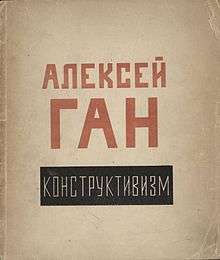Boris Arvatov
Boris Arvatov (1896 Kiev - 1940) was a Russian artist and art critic. He was active in the constructivist movement.[1]
Arvatov was involved with the Institute of Artistic Culture (INKhUK) when it was founded in 1920. Here he met fellow theorists Osip Brik, Boris Kushner and Nikolai Tarabukin with whom he developed the productivist approach to the role of the 'artist', which they wanted to be orientated towards a more industrial approach aimed at producing socially useful objects.[1]
Art and Production
Art and Production (Russian: Искусство и производство) was published in Russian in 1926. An amended version translated into German as Kunst und Prodiktion was published in Munich in 1972. Spanish and Italian translations appeared in 1973. An English translation was published in 2017.[2]
In 1940 he committed suicide.
References
- Kiaer, Christina (199). "Boris Arvatov's Socialist Objects". October. 81: 105–118. JSTOR 779021.
- Arvatov, Boris (2017). Art and Production. London: Pluto Press. ISBN 9780745337364.
